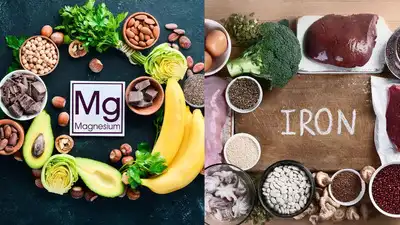Magnesium and iron are essential minerals that keep your body energised, balanced, and functioning at its best. Iron supports oxygen transport, energy production, and immunity, while magnesium regulates hundreds of vital processes, including muscle function, sleep, and heart health. Many people take these nutrients as supplements, but a common question arises—can magnesium and iron be taken together? The simple answer is yes, though timing and dosage matter for proper absorption. Knowing how these minerals interact, when to take them, and possible side effects can help you maximise their benefits while avoiding unwanted digestive issues or nutrient imbalances.
Benefits of taking magnesium and iron
- Iron supports oxygen transport: It is essential for producing haemoglobin, which carries oxygen in the blood. Low iron can cause fatigue, weakness, and anaemia.
- Iron aids overall growth and function: It contributes to muscle metabolism, hormone production, immune health, and normal development.
- Magnesium regulates vital processes: Involved in over 300 biochemical reactions, it helps control blood pressure, blood sugar, and heart rhythm, while also keeping bones and muscles strong.
- Magnesium supports mental and physical wellbeing: A study published inthe Journal Nutrients, links it with better sleep, fewer migraines, improved mood, and reduced anxiety or depression.
- Combined benefits for anaemia prevention: Low magnesium increases anaemia risk, while adequate intake may protect against it. Taking both minerals may help prevent and manage deficiencies.
While beneficial together, excess intake of iron or magnesium can lead to side effects, making proper dosage and timing important.
When to take magnesium and iron
Although magnesium and iron can be taken together, the timing matters. Iron is absorbed best on an empty stomach, ideally one hour before or two hours after meals. However, it can cause stomach discomfort for some people, in which case taking it with a small amount of food may help—though dairy, coffee, tea, and high-fibre foods should be avoided, as they reduce absorption.Magnesium is generally better tolerated when taken with food, since an empty stomach increases the likelihood of nausea or diarrhoea. Because of these differences, many experts recommend taking iron in the morning and magnesium in the evening. Not only does this improve absorption, but magnesium’s calming effects may also support better sleep.If you are prescribed both supplements, spacing them out by at least two hours is ideal. Your healthcare provider may also recommend specific forms of these minerals to maximise absorption—ferrous salts for iron and chelated magnesium such as magnesium glycinate, which tends to be gentler on the stomach.
When not to take them together
There are certain cases when taking magnesium and iron together may not be advisable. Both minerals can cause gastrointestinal upset, and combining them may increase the risk of nausea, constipation, or diarrhoea. People with sensitive stomachs often do better separating their doses.High doses of either nutrient may also compete for absorption. For example, one case study published in NIH, reported that excessive use of magnesium-based laxatives interfered with iron absorption, leading to iron deficiency anaemia. To avoid this, it is best to separate large doses and choose supplement forms that are better absorbed.Additionally, individuals with specific health conditions need to be cautious. Those with haemochromatosis should avoid excess iron, as it can lead to dangerous iron overload. People with kidney disease must be careful with magnesium supplementation, as it may increase the risk of high blood magnesium levels. Always consult a healthcare provider before starting new supplements.
Safe and effective tips for taking magnesium and iron
The safest way to take magnesium and iron supplements is under medical supervision, especially if you have been diagnosed with a deficiency. Your doctor may recommend a multivitamin containing both minerals in safe proportions or prescribe separate supplements tailored to your needs.For best results, take iron on an empty stomach with a source of vitamin C, such as orange juice, which enhances absorption. Avoid pairing it with calcium-rich foods or beverages, as calcium competes with iron in the digestive tract. Magnesium should be taken with a meal to reduce stomach upset and improve uptake.Spacing iron and magnesium by a few hours also reduces the likelihood of side effects and absorption issues. A common routine is iron in the morning, followed by magnesium in the evening, which also takes advantage of magnesium’s natural relaxation benefits. Be mindful of potential interactions with medications. Iron can interfere with antibiotics, levothyroxine, and certain Parkinson’s medicines, while magnesium may interact with diuretics, bisphosphonates, and some heart medications. Keeping your doctor informed about all supplements and medicines you take will help you avoid complications.Disclaimer: This article is for general informational purposes only and is not a substitute for professional medical advice, diagnosis, or treatment. Always seek the guidance of a qualified healthcare provider regarding any medical condition or lifestyle change.Also Read: Can your nose predict death? Smell loss linked to dying within 5 years











